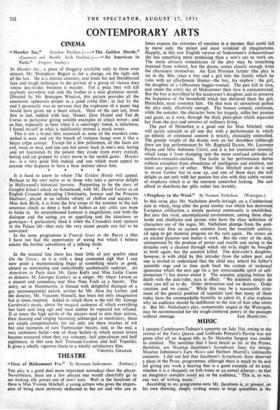"Prophesy to the Wind." By Norman Nicholson. (Watergate.) IN this
verse play Mr. Nicholson dwells lovingly on a Cumberland dale in which, long after the great atomic war which has destroyed European ciflisation, a simple pastoral community is established. But into this vivid, uncomplicated environment, among these shep- herds and chieftains and pirates who have the clear definition of characters out of the sagas, Mr. Nicholson plumps from the post- atomic-war blue an earnest scientist from the twentieth century. all agog to get material progress on the rails again. He comes on an ancient dynamo and makes it work. But the ruler' of the dale, unimpressed by the promise of power and wealth and seeing in the dynamo only a channel through which old evils might be brought to birth 'again, has the scientist killed. The dale-ruler's daughter, however, is with child by this intruder from the ashen past, and one is invited to understand that. the child may inherit .his father's scientific urge and in time push back the curtain of technical ignorance which the new- age (in a not unreasonable spirit of self- protection ?) has drawn about it. The scientist, arguing before his death with the dale-ruler, says in effect: " We scientists simply do what you tell us to do. Order destruction and we destroy. Order creation and we create." While this may be a reasonable state- ment of the general position of scientists (not that many of them today have the commendable humility to admit it), it also explains why an audience should be-indifferent to the fate of him who utters it. But Mr. Nicholson's play, competently staged at the Watergate, may be recommended for the tough-timbered poetry of the passages






























 Previous page
Previous page